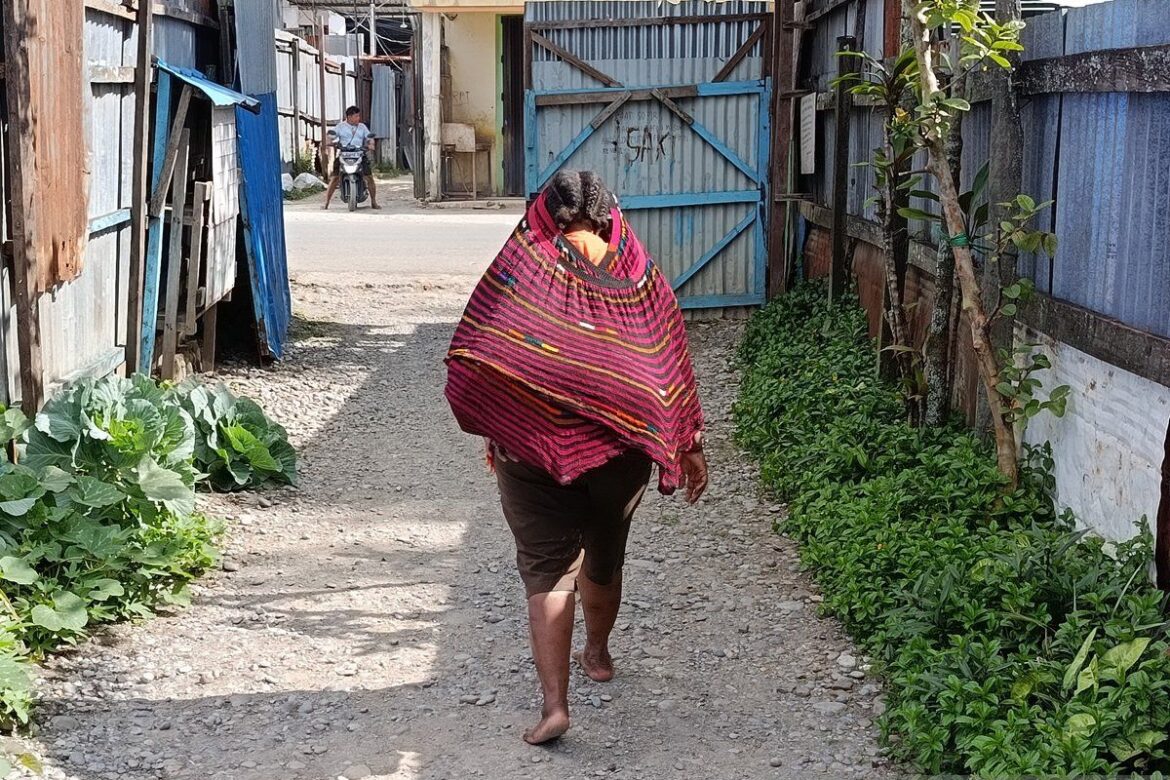In the remote and mist-veiled highlands of Papua, a quiet cultural renaissance is taking root — not in museums or performance halls, but in the hands and backs of mothers. Through the tradition known as Su Elege Aleka, generations of Papuan women are sustaining a deeply symbolic and practical heritage: the art of child-carrying in noken, a handwoven net bag made from natural fibers.
This ancestral practice, once under threat from modernization, is now experiencing a revival. It is being upheld not only as a method of nurturing infants but also as a profound gesture of identity, resilience, and intergenerational knowledge.
A Tradition Interwoven with Identity
Su Elege Aleka is more than just a way to carry children — it embodies a worldview. In this tradition, mothers gently place their infants into noken slung across their backs or heads, allowing the baby to remain close while the mother works, walks, or even climbs the steep forested paths of the highlands.
“It’s about warmth, about connection — physical and spiritual,” said Yuliana Wakerkwa, a cultural preservation activist from Jayawijaya. “When a mother carries her child in a noken, the child feels her heartbeat, her rhythm. It is a way of saying, ‘You belong to this land, to this culture.’”
The use of the noken is recognized by UNESCO as an Intangible Cultural Heritage of Humanity. But the Su Elege Aleka tradition carries this legacy into a more intimate sphere — the home, the field, and the mother’s embrace.
Women at the Forefront of Preservation
In the Papuan highlands, where infrastructure and access to education remain limited, it is women — particularly mothers and grandmothers — who serve as the primary stewards of this tradition. Many now pass on their knowledge of weaving, tying, and using the noken for baby-carrying to their daughters and community members.
Workshops and cultural gatherings are becoming more common in towns like Wamena, Yahukimo, and Lanny Jaya, where women gather not only to weave but to recount stories of motherhood and cultural pride.
“This is a form of resistance,” said Rosa Hubi, a midwife in Tolikara. “We may not have technology or luxury, but we have wisdom. And through Su Elege Aleka, we remind our children of who they are.”
Balancing Tradition and Health
Health workers in Papua have come to appreciate the practical benefits of the tradition. The positioning of babies in the noken promotes close maternal contact, which has been linked to emotional development and increased breastfeeding success — similar to what modern healthcare calls “kangaroo care.”
However, efforts are also being made to ensure the practice aligns with modern safety standards. NGOs and local health centers are working with communities to educate mothers on ergonomics and infant positioning to avoid musculoskeletal strain or breathing issues for newborns.
The collaboration between ancestral wisdom and modern health knowledge reflects a broader shift: Indigenous practices are no longer dismissed as outdated, but embraced as complementary.
Revival Amid Modern Pressures
Like many Indigenous customs across the Indonesian archipelago, Su Elege Aleka faces challenges. Urban migration, Westernized parenting norms, and the availability of strollers and baby carriers have contributed to the decline of traditional practices. Younger women in cities like Jayapura and Timika often choose convenience over custom.
Yet, amidst these pressures, elders and cultural activists are fighting to keep the tradition alive.
“We are not against change,” said Dr. Mesak Lokobal, an anthropologist at Cenderawasih University. “But change should not mean erasure. Traditions like Su Elege Aleka are living expressions of our humanity — and they must be protected as such.”
Cultural Future in a Noken
In a world increasingly defined by speed and disconnection, Su Elege Aleka offers a lesson in grounding. It shows that carrying a child — literally and culturally — is not a passive act, but one of great responsibility and love.
Back in the hills of Yahukimo, a young mother named Eli sits weaving a new noken for her baby daughter. When asked why she doesn’t use a modern baby carrier, she smiles gently.
“This,” she says, lifting the half-finished weave, “was made by my mother, and her mother before her. My daughter will feel them both.”
Conclusion
In a fast-changing world, the Su Elege Aleka tradition symbolizes the deep connection between Papuan mothers and their cultural heritage. It represents not just a practical way of caring for infants but a vital act of preserving identity, love, and ancestral wisdom. As modernization challenges these customs, the commitment of women in Papua to keep this tradition alive highlights the enduring power of cultural roots in shaping community and belonging.


